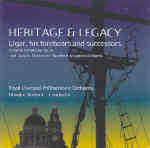This interesting and enjoyable program is worth having for the three least-familiar works, each enjoying (I believe) its CD premiere. Frederic Austin is best known today as a successful operatic baritone, but obviously he also was a very capable composer. The Sea Venturers (1934) is a brilliant piece of English “water music”, expertly scored and thematically distinctive somewhat in the manner of, perhaps, John Ireland. Douglas Bostock and the Liverpool orchestra play it extremely well, and they are vividly recorded. Alexander Mackenzie’s Prelude to Colomba (1883) gives us six-and-a-half minutes of grave, hymn-like meditation, not as distinctive as Austin’s work but certainly well made and quite lovely. Charles Stanford’s jolly overture to the opera Shamus O’Brien (1896) would grace any concert program today, and the only thing keeping this music from more frequent performance must be sheer ignorance. We owe Bostock a debt of gratitude for turning over yet another stone and uncovering more of the apparently inexhaustible riches of the English musical renaissance.
As the informative booklet notes make quite clear, composers such as Stanford and Mackenzie were consigned to oblivion by the mastery of the succeeding generation, led by Elgar and Vaughan Williams. The latter’s Tallis Fantasia is, of course, one of the great masterpieces of 20th century music–of any nationality–and Bostock gives it a very gentle, grave, stately performance in which slow tempos preclude the kind of passion you will find in, say, Barbirolli’s classic recording for EMI; but the Liverpool strings make lovely sounds and the engineers capture them with the necessary atmosphere. As for the ubiquitous Enigma Variations, it would be idle to pretend that this version stands with the very best, but it’s quite good in a traditional sort of way, with Nimrod sensitively done and a finale that gathers strength as it goes to reach a rousing conclusion, with the organ nicely present but never overpowering. In any event, this is a disc in which each piece should be heard in context, and as such it represents a whole that’s greater than the sum of its individual parts.
































